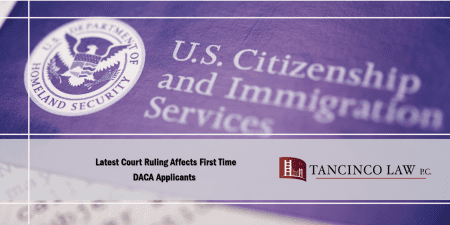On July 16, 2021, a federal court Judge Andrew Hanen ordered the U.S. Citizenship and Immigration Services (USCIS) to stop the processing and approval of new DACA applications. What is the impact of this decision on DACA recipients and those with pending DACA applications?
Jose turned 18 years old in January 2021. When Jose was 5 years old, he was brought to the United States by his Aunt and his immigration status was never legalized. He practically grew up in the United States and completed his high school education and dreams, one day, of becoming a physician.
When President Biden was elected, Jose filed for protection under the Deferred Action for Childhood Arrivals. This is the first time that he applied for DACA. The U.S. Citizenship and Immigration Services acknowledged receiving his application but no action has been taken so far. On Friday, July 16, 2021, Jose learned that the Federal Court Judge ruled against new DACA applicants. What are the chances that he will be granted employment authorization and protection under DACA?
The DACA Program
In 2012 President Obama created a policy called Deferred Action for Childhood Arrivals (DACA), calling for deferred action for certain undocumented young people who came to the U.S. as children. Applications under the program began on August 15, 2012. More than 800,000 DACA eligible individuals filed for protection and employment authorization under this DACA program.
Legal Challenges
DACA has always been the subject of legal challenges where certain States question the legality of the DACA program. When former President Trump took office, he immediately issued an order rescinding DACA. Several lawsuits were filed questioning the rescission of the DACA program.
On June 18, 2020, in Department of Homeland Security v. Regents of University of California,the U.S. Supreme Court struck down the Trump administration’s termination of the DACA program and ruled that the termination of DACA was “arbitrary and capricious” under the Administrative Procedures Act (APA). While it ruled against its termination, the Court did not rule on whether or not DACA itself is lawful, but merely held that the Trump administration did not follow the law when it tried to terminate the program. In Casa de Maryland v. U.S. Department of Homeland Security, a federal judge in the U.S. District Court of Maryland ordered the Department of Homeland Security (DHS) to reinstate the DACA program to its 2017, pre-termination status and to start accepting new applications.
On July 16, 2021, Judge Andrew Hanen, a federal judge in the State of Texas, issued a ruling declaring DACA as unlawful since, according to his decision, the Department of Homeland Security has no authority to create DACA and to prevent immigration officials from enforcing the removal provisions of the law.
Impact of the Decision: First Time DACA Applicants Adversely Affected
Jose’s application as illustrated above will be put on hold as a result of the recent decision.
Those who have received prior DACA protections and employment authorizations are not affected by the decision. Unfortunately, first time DACA applications will be placed on hold by the U.S. Citizenship and Immigration Services which means that no new DACA applications will be approved at this time. The federal Court decision blocked USCIS from approving any new DACA cases. Hence, all individuals who have submitted DACA initial applications (those that never had DACA and are applying for the first time) and have not received an approval from USCIS will have their application held. This applies to all initial cases that were not approved prior to July 16, 2021.
What about individuals who already had prior DACA for the first time and are renewing? If an applicant was recently granted DACA for the first time, his/her DACA will remain valid and may be renewed.
Future of DACA
President Biden vowed to appeal the federal court decision. But while this is on appeal, the new DACA applicant’s fate will be put on hold. The more permanent solution is for Congress to pass the American Dream and Promise Act which bill is waiting to be passed.
President Obama emphasized the importance of passing legislation to protect our DREAMers. On his Twitter posting, he said that “For more than nine years, DREAMers have watched courts and politicians debate whether they’ll be allowed to stay in the only country many of them have ever known, it’s long past time for Congress to act and give them the protection and certainty they deserve.”
Let us continue to strongly support our DREAMers, by calling and urging our representatives in Congress to pass the American Dream and Promise Act. Undeniably, our young DREAMers deserve better.
(Atty. Lourdes Santos Tancinco, Esq. is an immigration attorney with the Tancinco Law Offices, a San Francisco CA based law firm. She may be reached at 1 888 930 0808, law@tancinco.com , facebook.com/tancincolaw, or through her website www.tancinco.com)


